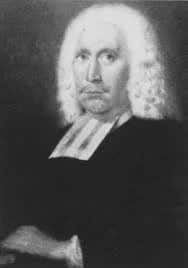In the framework of our reflections on the “Nadere Reformatie” and its representatives, our attention will focus on one born in Scotland, although he was greatly regarded by the Dutch as “one of their own.” His name is Alexander Comrie.
Alexander Comrie liked to call himself “Scoto Britanus.” He was born in Perth, Scotland in 1706. He received a godly training in Calvinism and the Westminster Standards from his parents. It is most likely that he was converted under the ministry of Ralph and Ebenezer Erskine, the founders of the Scottish Secession Church.
Due to economic hardship, Comrie, at the age of twenty, left his studies and moved to the Low Countries, finding employment in Amsterdam. While working in this capital city, Comrie became acquainted with a God-fearing man who told him about the spiritual needs in villages in the neighborhood of Leiden. In God’s providence, Comrie arrived in that area and was led to make friends with some influential patrons who enabled him to follow his deeper inclination of studying for the ministry.

In 1729, Comrie was admitted to the University of Franeker as a student of divinity. Four years later, in 1733, he transferred to Leiden to study philosophy. In 1734, he received his Doctorate in Philosophy. Upon graduation, he applied to the classis of Leiden and NederRhynland to be examined with a view of entering the ministry. HisDoctorate in Philosophy was required in the defense of his dissertation, “the basis of the morality and the essence of virtue.” During that year, he also married Johanna de Heyda whose brother was a minister in Rotterdam. The marriage would last only four years when the Lord called Johanna to higher glory. They had one daughter. Comrie never remarried.
In February 1736, Comrie received and accepted a call to the church in the village of Woubrugge. His pastorate was the uneventful life of a small village pastor. He spoke and wrote the Dutch language with great difficulty, but left his imprint upon the hearts of the Calvinistic people whom he encountered. He had the great advantage of writing with the familiarity of the Westminster Divines and a firm conviction that the Puritan theology was the best of the old Calvinistic principles.
Comrie had a great philosophical grasp of dogmatic problems of his day. He traced and denounced the Pelagian and Arminian errors. His influence on the common people came through in his deep piety reflected in both his writings and his life. He was extremely powerful in his praying. Although his visits were few and far between, his method of family visiting was unique. He would visit for hours with the clear intention to do pastoral work for the spiritual well-being of all within the home—parents, children, and servants. He would leave, only if he had the assurance that changes had been made and that the family had turned to the Heavenly Master.
Comrie made valuable contributions in explaining the doctrines of predestination, covenants, justification, and the value of faith. In regard to faith, he placed great emphasis on the element of assurance, which he held to be the very essence of faith. Comrie was a convincing follower of Voetius. He was familiar with supralapsarianism and put up fierce resistance to the spirit of tolerance which he believed was invading the church.
All thirty-seven years of Comrie’s pastorate were spent in his only charge of Woubrugge. He was involved as pastoral supply in Gouda where he died in 1774.
Mr. Nicolaas Van Dam is a member of the United Reformed Church in Escondido, California.
